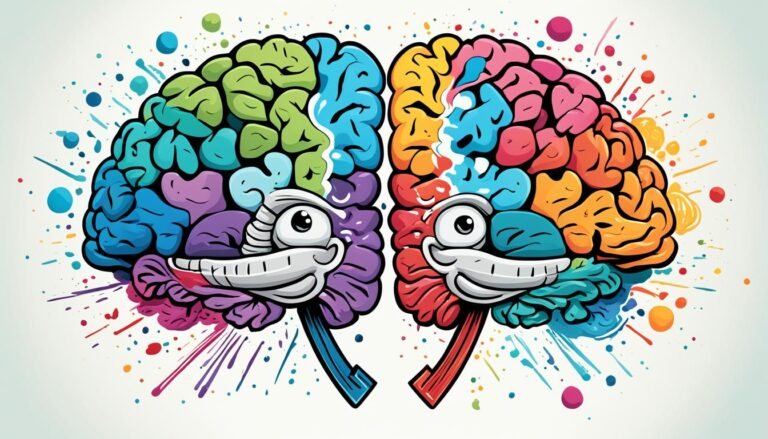Personality Traits Most Common in Innovators and Creative Thinkers
Innovators and creative thinkers have special traits that make them unique. They think in new ways, solve problems creatively, and take risks. They are curious and open to learning new things. They don’t mind challenging the norm with their ideas. And they are good at adapting to change.
By understanding what makes these people tick, we can learn a lot. Traits like being open to new ideas, being diligent, not always getting along with others, having a high IQ, and being calm help them a lot. This mix helps them come up with new, amazing ideas and make real changes.
Next, we’ll look deeper into these special personality traits. We’ll see how they encourage new ideas and creativity.
Key Takeaways:
- Innovators and creative thinkers have unique traits that lead to success.
- These include openness, diligence, being okay with not getting along, having a sharp mind, and staying calm.
- Innovators are full of big ideas. They are open, take risks, love to learn, think differently, and are quick to adapt.
- Learning about these traits can help develop your own creativity and innovative skills.
- Solving problems in creative ways can be learned. It just takes practice and keeping an open mind.
The Importance of Openness to New Ideas and Experiences
Innovators and creative thinkers often share an important trait – being open to new ideas and experiences. This quality helps them think creatively and find innovative solutions. Being open-minded means they are willing to look at things from different angles. They also consider ideas that may seem strange at first.
This approach lets them break away from old ways of thinking. It encourages them to try new things and accept different opinions. By being open, they are always looking to learn something new. This helps them stay ready to tackle problems in new ways.
“The greatest innovations often arise from a willingness to challenge established norms and explore ideas that initially seem outlandish.”
Open-minded people are curious and constantly looking for new information and ideas. They know that working with others who have diverse backgrounds is key to innovation. Together, they can come up with truly novel solutions.
Being open allows for creativity that’s not bound by the usual constraints. It lets innovators find new ways to deal with problems. By thinking outside the box, they can combine different ideas to create something truly unique.
In our fast-changing world, being open to new things is more important than ever. It means you can always be ready for the next big thing. By keeping an open mind, people can find new opportunities that others might miss.
Benefits of Openness to New Ideas and Experiences:
- Enhanced creativity and innovative thinking
- Expanded knowledge and intellectual growth
- Increased adaptability and agility
- Improved collaboration and teamwork
- Greater resilience in the face of change
Being open to new ideas is a skill that can grow with you. By embracing curiosity, looking at things from different angles, and questioning what you know, you can become more open. This can lead to surprising and game-changing ideas.
The Role of Conscientiousness in Innovation
Innovators must be highly conscientious to make their visions real. This trait shows in a strong work ethic, not giving up, and dedication to solve problems.
To succeed, innovators face and overcome many difficulties. They have the grit to keep moving despite these challenges. Their determination is what keeps them on their path, making steady progress.
Dedication plays a big role in this too. Innovators love what they do and work hard to see their dreams through. They are determined and their focus never wavers, ensuring their projects get the attention they need to thrive.
“Conscientiousness is the cornerstone of innovation. It is the unwavering commitment, perseverance, and dedication that allows innovators to transform their ideas into reality.”
Being conscientious helps innovators face innovation’s tough parts. They have the focus and discipline to beat challenges and achieve their goals.
Table: Traits of Conscientiousness in Innovators
| Trait | Description |
|---|---|
| Strong Work Ethic | Innovators have a diligent approach to their work, consistently putting in the effort required to achieve their goals. |
| Perseverance | They demonstrate resilience and determination, persisting through challenges and setbacks. |
| Dedication | Innovators exhibit a deep passion for their work and a strong commitment to bringing their ideas to fruition. |
Conscientiousness launches innovation. By showing endurance and dedication, innovators steer through creativity’s twists. They not only survive but bring their ideas to life.
The Power of Disagreeableness in Driving Innovation
Innovation often comes from those who aren’t afraid to disagree. This doesn’t mean they’re rude. It means they’re willing to challenge common beliefs. They have the courage to stand up for new ideas, even when others doubt them.
They think differently from most people. They question the way things are and suggest new ways. This approach has led to many new discoveries and advances throughout history.
“The people who are crazy enough to think they can change the world are the ones who do.” – Steve Jobs
Innovators point out flaws in the current way of doing things. They make others think about better solutions. Even when others disagree, they continue fighting for their ideas.
This boldness sets them apart. Instead of following what’s already known, they look for new answers. Even if it’s not easy, they push forward to make real changes and innovations happen.
Being disagreeable for the right reasons is crucial for progress. It’s not about causing trouble but about improving things. Innovators understand this and keep going, no matter the challenges.
The Benefits of Disagreeableness in Innovation
Disagreeing with common ideas can lead to breakthroughs. This can create new paths and chances for growth. It welcomes fresh, unique thoughts and solutions. Disagreeableness helps in:
- Breaking down barriers and encourages diverse perspectives.
- Stimulating critical thinking and problem-solving.
- Fostering a culture of innovation and continuous improvement.
| Benefits of Disagreeableness in Innovation | Examples |
|---|---|
| Challenging the Status Quo | Introducing disruptive technologies that revolutionize industries. |
| Standing up for Ideas | Advocating for social change and equality. |
This table shows how important being disagreeable can be. It leads to big breakthroughs and positive change. By questioning norms and standing up for new ideas, innovators help move us forward.
The Impact of High IQ on Innovation
Innovative people often have a high level of intelligence. This is usually measured by IQ scores. Such individuals can synthesize vast amounts of information quickly. They think critically and find new ways to solve problems with their minds. A high IQ lets them grasp complicated ideas easily. It also helps them see connections that might escape others.
“High IQ individuals have a unique ability to process information at a rapid pace and make connections between seemingly unrelated ideas. This allows them to approach problems from multiple perspectives and come up with creative solutions.” – Dr. Jane Lewis, Professor of Psychology at Harvard University
Critical thinking is crucial for those with high IQs. It aids them in analyzing and evaluating information. With this, they are able to look at the good and bad in different ways to solve problems. Skilled at synthesizing information from various sources, they get a complete view of the issue at hand.
Benefits of High IQ in Innovation:
- Ability to identify patterns and trends
- Capacity to think abstractly and conceptually
- Rapid problem-solving skills
- Efficient information processing
- Enhanced creativity through diverse knowledge integration
High IQ individuals are also quick learners. They easily understand new concepts and material. This helps them keep up with new trends and technologies. It gives them an edge in today’s fast-paced world.

A high IQ is key in the innovation process. It helps individuals think critically, digest information, and develop new, exciting ideas. Many other factors help, but a high IQ is very important for the success of creative minds.
| Key Traits of High IQ Individuals | Impact on Innovation |
|---|---|
| Critical thinking | Enables objective analysis and evaluation of ideas |
| Strong problem-solving skills | Facilitates efficient and effective resolution of challenges |
| Quick information processing | Allows for rapid synthesis and integration of knowledge |
| Conceptual thinking | Enables abstract and creative idea generation |
| Adaptability | Supports learning and adjustment to new situations |
The Role of Low Neuroticism in Handling Innovation Challenges
In the journey of innovation, facing stress and challenges is expected. Innovators with low neuroticism have an edge. They show resilience and can tackle tough situations well.
Those with low neuroticism find it easier to recover from failure. They see failure as a chance to learn. They adjust their plans swiftly. They know that failures can lead to success. They keep a positive attitude.
“Low neuroticism allows innovators to persevere and stay focused on their goals, even in the face of adversity.”
Also, having low neuroticism means you can stay calm under pressure. This calmness helps in making smart choices in stressful times. Innovators, by staying composed, can come up with new ways to solve problems.
Moreover, low neuroticism helps keep innovators balanced and focused. They manage their time wisely. They avoid stress overload. This skill helps them work steadily towards their goals and be productive.
The Benefits of Low Neuroticism in Innovation:
- Resilience: Innovators with low neuroticism bounce back from failure and adapt their strategies.
- Calmness Under Pressure: Low neuroticism enables innovators to maintain a calm demeanor, helping them make rational decisions.
- Balance and Perspective: Innovators with low neuroticism maintain a sense of balance and prioritize tasks effectively.
Low neuroticism is crucial for innovators facing stress and overcoming challenges. With resilience, staying calm, and keeping balance, these innovators drive their ideas forward.
The Significance of Intrinsic Motivation in Driving Innovation
Innovation benefits greatly from intrinsic motivation, as it fuels creative individuals. They’re driven by a passion for learning and genuine curiosity about their area. This motivation lets them surpass their limits, explore new areas, and offer innovative solutions.
Intrinsic motivation acts as a never-ending flame for these innovators. It keeps them moving forward, even when facing challenges. This drive leads them to keep learning, gain new skills, and broaden their world view.
This motivation comes from the love of learning and the joy found in discovery. Those inspired by it aren’t just after money or fame. Their main goal is to push boundaries and have a real impact.
“When you have a strong intrinsic motivation, you become unstoppable,” according to Dr. Lisa Johnson, an expert in innovative thinking.
For these people, learning never stops. They love tackling new challenges, learning new things, and mastering skills. Their love for learning spurs innovation, bringing forth new ideas and solutions.
The Role of Passion for Learning
Passion for learning is at the heart of intrinsic motivation. Innovators are always looking to learn more and improve their expertise. This excitement for learning enhances their creativity and ability to come up with new ideas.
“Curiosity is the engine of innovation, and a deep passion for learning is its fuel,” notes Professor David Martinez, a creative problem solving expert.
This passion moves innovators to put in extra work, spending hours on research and experiments. It boosts their creativity, helping them to solve complex issues uniquely.
“Passion is the fuel that drives the engine of innovation. Without it, the engine stalls,” says Dr. Sarah Thompson, a famous entrepreneur.
Like intrinsic motivation, passion for learning can’t be artificially created. It’s an inner wish to explore and grow. When fueled by this genuine passion, innovators can truly change the world.
| Intrinsic Motivation | Passion for Learning |
|---|---|
| Driven by internal desire and passion | Arises from a love for acquiring knowledge |
| Not motivated solely by external rewards | Not driven by monetary gain or recognition |
| Fuels dedication and commitment | Ignites creativity and ingenuity |
| Empowers innovators to push boundaries | Stimulates innovative thinking |
How Personality Traits Can Be Developed
We used to think that only some people had the gift of innovation. But now, we know it’s not just about genes. Research points to something promising: Creativity is a skill we can all grow. It’s true that some of our ability might come from family traits. Yet, what really matters is what we do to learn, practice, and get inspired by others.
Nurturing creativity is all about trying different ways to think. You can boost creativity by working on your thinking and problem-solving skills. For example, try to connect ideas that don’t seem related. This is called associating. It lets you create something new from what you already know. You can also improve by asking questions and observing closely. These skills help you change your point of view and break old thinking patterns.
“Learning and practice are key components in the development of creative thinking. Through exposure to diverse experiences and ideas, individuals can expand their knowledge base and develop a broader frame of reference for problem-solving.”
It’s also great to meet others who think like you do. Networking with people from various fields can spark new ideas. When you work with a team that’s different from you, your creative skills can really grow.
Trying new things can be super helpful too. Don’t be afraid to do something you’ve never done. Even if you fail, you’ll learn. This helps you get better at being creative. It’s all about stepping outside what you already know.
Nurturing Creativity in Education
Teaching creativity early is key, especially in schools. By adding activities that boost imagination and problem-solving, we help young people be more creative.
- Do projects that let students show what interests them in new ways.
- Get them to work with others. This mixes different ideas and leads to creative results.
- Make a place where making mistakes is okay. This helps students feel safe to try new things.
- Let them see lots of different kinds of works of art, science, and history. This broadens their creativity.
- Connect them to people who work in areas they’re curious about. This gives them a taste of the real world.
By doing these things, schools can really help students be creative. It gives them the skills they need to think outside the box.
| Techniques for Nurturing Creativity | Description |
|---|---|
| Associating | Connecting unrelated concepts to generate new ideas. |
| Questioning | Challenging assumptions and exploring new perspectives. |
| Observing | Sharpening awareness and seeking inspiration from the surrounding environment. |
| Networking | Engaging with diverse individuals to gain fresh insights and foster collaboration. |
| Experimentation | Stepping out of comfort zones, trying new approaches, and embracing failure as a learning opportunity. |
Conclusion
Innovators and creative thinkers have special qualities that help them succeed. They are always open to new ideas. This allows them to think creatively and find unique solutions.
They are hardworking and don’t give up easily, even when they face challenges. Standing by their thoughts and ideas, they challenge what’s known. Their courage to do this is what makes new things happen.
Also, their intelligence lets them process information wisely. They can handle stress well. This is because they are motivated from within and always eager to learn more.
These qualities, combined with experience, learning, and exposure to different views, make for great innovators.
Source Links
- https://www.game-changer.net/2024/01/23/marc-andreessen-the-5-personality-traits-of-an-innovator/
- https://www.truity.com/blog/9-personality-traits-highly-successful-creatives-how-many-do-you-share
- https://marriott.byu.edu/magazine/faculty-research/the-innovators-dna-five-skills-to-develop-your-creativity








